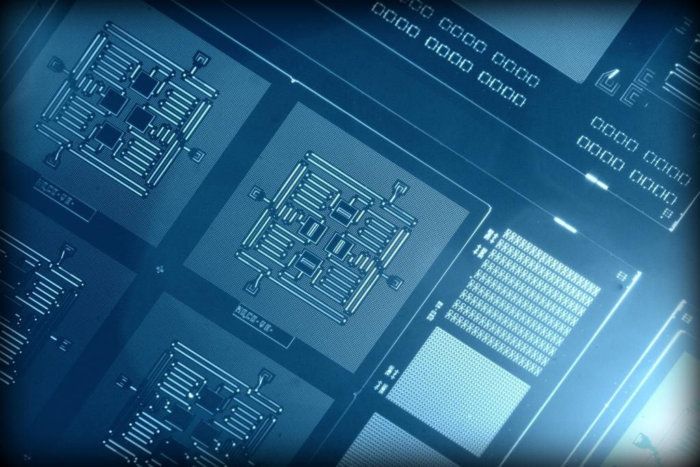Multicoloured qubits could boost quantum computing.




Glad others have caught the QC Light. I told so many we’re not 10+ or even 10 years away.
Quantum computing got a big push forward this month as researchers managed to create quantum dot light-emitting diodes (LED’s) that have the ability to produce entangled photons that could be used to encode information. Previously, the highest number of photons known to be entangled at one time was 8, but as of June, that number has now risen to 10.

Researchers from Brown University have demonstrated an unusual method of putting the brakes on superconductivity, the ability of a material to conduct an electrical current with zero resistance.
The research shows that weak magnetic fields—far weaker than those that normally interrupt superconductivity—can interact with defects in a material to create a “random gauge field,” a kind of quantum obstacle course that generates resistance for superconducting electrons.
“We’re disrupting superconductivity in a way that people haven’t done before,” said Jim Valles, a professor of physics at Brown who directed the work. “This kind of phase transition involving a random gauge field had been predicted theoretically, but this is the first time it has been demonstrated in an experiment.”

Want a louder bass or speakers in general get Quantum.
Ora, a Montreal-based tech start-up, has announced that it has developed the first consumer-ready graphene loudspeaker.
The company believes that graphene holds the ideal properties sought after in loudspeaker diaphragms: stiffness (graphene is stronger than diamond) and lightness (graphene is the thinnest known material, one atom thick).
Building acoustic transducers with these properties allows for the production of smaller, lighter, more energy-efficient loudspeakers, while also improving sound quality. However, the difficulty and expense of mass-producing graphene has presented a roadblock to bringing the material to consumer products.

There is a worldwide scientific experiment today aiming to test the laws of quantum physics via a video game – and you’re invited!
The BIG Bell Test: worldwide quantum experiments powered by human randomness aims to conduct a series of quantum experiments in labs around the world that, for the first time, will be controlled by human decisions made by volunteers (aka Bellsters). Here’s how you can take part.
Coordinated by ICFO, the Institute of Photonic Sciences, the experiments will test Albert Einstein’s idea of “local realism,” a phenomenon at the very core of the mysteries of the quantum world.


There has been a lot of digital ink spilled over the recent paper on the reactionless thrust device known as the EMDrive. While it’s clear that a working EM Drive would violate well established scientific theories, what isn’t clear is how such a violation might be resolved. Some have argued that the thrust could be an effect of Unruh radiation, but the authors of the new paper argue instead for a variation on quantum theory known as the pilot wave model.
One of the central features of quantum theory is its counter-intuitive behavior often called particle-wave duality. Depending on the situation, quantum objects can have characteristics of a wave or characteristics of a particle. This is due to the inherent limitations on what we can know about quanta. In the usual Copenhagen interpretation of quantum theory, an object is defined by its wavefunction. The wavefunction describes the probability of finding a particle in a particular location. The object is in an indefinite, probabilistic state described by the wavefunction until it is observed. When it is observed, the wavefunction collapses, and the object becomes a definite particle with a definite location.
While the Copenhagen interpretation is not the best way to visualize quantum objects it captures the basic idea that quanta are local, but can be in an indefinite state. This differs from the classical objects (such as Newtonian theory) where things are both local and definite. We can know, for example, where a baseball is and what it is doing at any given time.

Time travel could be possible, says a group of physicists who’ve come up with a new interpretation of our universe, says the Sun U.K.
Professor Howard Wiseman and Dr. Michael Hall from Griffith University’s Centre for Quantum Dynamics, and Dr. Dirk-Andre Deckert from the University of California, say there are many universes, including identical ones to ours, that “influence one another through quantum mechanics.” The theory is called the “Many-Worlds Interpretation.”
What this means is that travelling through time within our universe is conceivable, says the Sun.

In experiments with magnetic atoms conducted at extremely low temperatures, scientists have demonstrated a unique phase of matter: the atoms form a new type of quantum liquid or quantum droplet state. These so called quantum droplets may preserve their form in absence of external confinement because of quantum effects. The joint team of experimental physicists from Innsbruck and theoretical physicists from Hannover report on their findings in the journal Physical Review X.$$!ad_code_content_spilt_video_ad!$$” Our Quantum droplets are in the gas phase but they still drop like a rock,” explains experimental physicist Francesca Ferlaino when talking about the fascinating experiment. In the laboratory, her team observed how macrodroplets formed in a quantum gas.